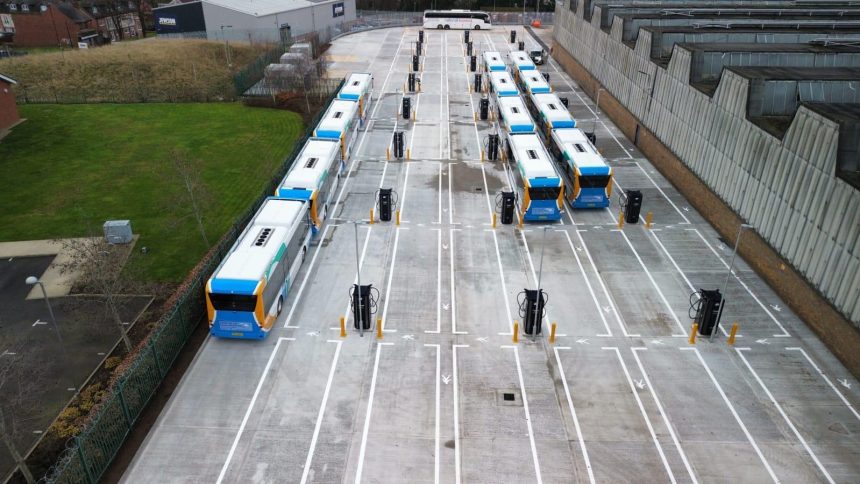The first examples of what will be a 57-strong battery-electric bus fleet with Stagecoach in Chesterfield have entered service after work there was completed by VEV. It is the first of four electric bus readiness projects that the supplier is undertaking for the group.
The electric vehicles will replace more than two-thirds of the diesel bus fleet in Chesterfield. Funding is from the Zero Emission Bus Regional Areas scheme, Derbyshire County Council, and Stagecoach. Those in service so far are Yutong E10 and E12 models.
Chesterfield is the largest of the four planned electrification projects between Stagecoach and VEV. The others are at Leamington Spa, Nuneaton and Rugby, and when complete, the quartet will capture 150 battery-electric buses.
VEV is providing comprehensive support for the Stagecoach fleet electrification strategy starting with detailed fleet and power analysis followed by charger installation, staff training, 24/7 operational assistance, and the generation of insights on its electric fleet.
At Chesterfield, infrastructure includes 27 dual DC 120kW chargers from Eko Energetyka to give 54 plug-in connections. A 2.5MVA power upgrade has also been rolled out.
Currently under construction at the site is a 234kW peak solar installation, with panels on the depot roof. It will generate approximately 200MWh of power per year at what VEV says is roughly half the cost of grid electricity, save a claimed 48,000kg of carbon emissions per annum, and reduce demand on the grid.
The end-to-end approach from the supplier started with a detailed analysis of operational data, including running boards, power consumption patterns, and operating requirements. That informed the design of the bespoke solution.
Stagecoach will use dynamic load management and optimise power purchasing through installation of the VEV-IQ smart charging and energy management platform. It interfaces with bus telematics to monitor battery state of charge, location, and range.
Stagecoach Asset Management Director Tony Cockcroft says that completion of the work with VEV in Chesterfield “marks a significant step forward in our electrification journey.”
He continues: “VEV’s support has been crucial in ensuring a smooth transition to electric operations. The sophisticated VEV-IQ platform provides us with the insights and control we need to optimise our fleet operations, make informed decisions about our business, and enable additional revenue generation.
“We look forward to replicating this success with VEV at our Leamington, Nuneaton and Rugby sites.”
VEV CEO Mike Nakrani notes that the work “is not just about installing chargers.” Instead, it is “about providing a complete solution that encompasses fleet analysis, infrastructure, power optimisation, staff training, and ongoing operational support to ensure a successful transition of the bus network to electric vehicles.”



























